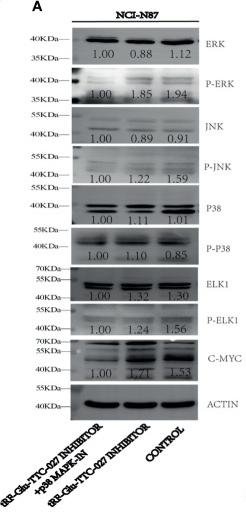Phospho-ELK1 (Ser383) Antibody - #AF3212
| Product: | Phospho-ELK1 (Ser383) Antibody |
| Catalog: | AF3212 |
| Description: | Rabbit polyclonal antibody to Phospho-ELK1 (Ser383) |
| Application: | WB IHC IF/ICC IP |
| Cited expt.: | WB |
| Reactivity: | Human, Mouse, Rat, Monkey |
| Prediction: | Pig, Bovine, Horse, Sheep, Rabbit, Dog, Xenopus |
| Mol.Wt.: | 62kDa; 45kD(Calculated). |
| Uniprot: | P19419 |
| RRID: | AB_2834504 |
Product Info
*The optimal dilutions should be determined by the end user. For optimal experimental results, antibody reuse is not recommended.
*Tips:
WB: For western blot detection of denatured protein samples. IHC: For immunohistochemical detection of paraffin sections (IHC-p) or frozen sections (IHC-f) of tissue samples. IF/ICC: For immunofluorescence detection of cell samples. ELISA(peptide): For ELISA detection of antigenic peptide.
Cite Format: Affinity Biosciences Cat# AF3212, RRID:AB_2834504.
Fold/Unfold
ELK 1; Elk1; ELK1 member of ETS oncogene family; ELK1 protein; ELK1, ETS transcription factor; ELK1_HUMAN; ELK2 member of ETS oncogene family; ETS domain containing protein Elk 1; ETS domain containing protein Elk1; ETS domain protein Elk1; ETS domain-containing protein Elk-1; ETS like gene 1; Member of ETS oncogene family; Oncogene Elk1; Tyrosine kinase (ELK1) oncogene;
Immunogens
A synthesized peptide derived from human ELK1 around the phosphorylation site of Ser383.
- P19419 ELK1_HUMAN:
- Protein BLAST With
- NCBI/
- ExPASy/
- Uniprot
MDPSVTLWQFLLQLLREQGNGHIISWTSRDGGEFKLVDAEEVARLWGLRKNKTNMNYDKLSRALRYYYDKNIIRKVSGQKFVYKFVSYPEVAGCSTEDCPPQPEVSVTSTMPNVAPAAIHAAPGDTVSGKPGTPKGAGMAGPGGLARSSRNEYMRSGLYSTFTIQSLQPQPPPHPRPAVVLPSAAPAGAAAPPSGSRSTSPSPLEACLEAEEAGLPLQVILTPPEAPNLKSEELNVEPGLGRALPPEVKVEGPKEELEVAGERGFVPETTKAEPEVPPQEGVPARLPAVVMDTAGQAGGHAASSPEISQPQKGRKPRDLELPLSPSLLGGPGPERTPGSGSGSGLQAPGPALTPSLLPTHTLTPVLLTPSSLPPSIHFWSTLSPIAPRSPAKLSFQFPSSGSAQVHIPSISVDGLSTPVVLSPGPQKP
Predictions
Score>80(red) has high confidence and is suggested to be used for WB detection. *The prediction model is mainly based on the alignment of immunogen sequences, the results are for reference only, not as the basis of quality assurance.
High(score>80) Medium(80>score>50) Low(score<50) No confidence
Research Backgrounds
Transcription factor that binds to purine-rich DNA sequences. Forms a ternary complex with SRF and the ETS and SRF motifs of the serum response element (SRE) on the promoter region of immediate early genes such as FOS and IER2. Induces target gene transcription upon JNK-signaling pathway stimulation (By similarity).
Sumoylation represses transcriptional activator activity as it results in recruitment of HDAC2 to target gene promoters which leads to decreased histone acetylation and reduced transactivator activity. It also regulates nuclear retention.
On mitogenic stimulation, phosphorylated on C-terminal serine and threonine residues by MAPK1. Ser-383 and Ser-389 are the preferred sites for MAPK1. In vitro, phosphorylation by MAPK1 potentiates ternary complex formation with the serum responses factors, SRE and SRF. Also phosphorylated on Ser-383 by MAPK8 and/or MAKP9. Phosphorylation leads to loss of sumoylation and restores transcriptional activator activity. Phosphorylated and activated by CAMK4, MAPK11, MAPK12 and MAPK14. Upon bFGF stimulus, phosphorylated by PAK1 (By similarity).
Nucleus.
Lung and testis.
Belongs to the ETS family.
Research Fields
· Cellular Processes > Cellular community - eukaryotes > Focal adhesion. (View pathway)
· Environmental Information Processing > Signal transduction > MAPK signaling pathway. (View pathway)
· Environmental Information Processing > Signal transduction > ErbB signaling pathway. (View pathway)
· Environmental Information Processing > Signal transduction > Ras signaling pathway. (View pathway)
· Human Diseases > Neurodegenerative diseases > Prion diseases.
· Human Diseases > Infectious diseases: Parasitic > Leishmaniasis.
· Human Diseases > Infectious diseases: Viral > Hepatitis B.
· Human Diseases > Infectious diseases: Viral > HTLV-I infection.
· Human Diseases > Cancers: Overview > Pathways in cancer. (View pathway)
· Human Diseases > Cancers: Overview > Proteoglycans in cancer.
· Human Diseases > Cancers: Specific types > Endometrial cancer. (View pathway)
· Human Diseases > Cancers: Specific types > Hepatocellular carcinoma. (View pathway)
· Organismal Systems > Endocrine system > Insulin signaling pathway. (View pathway)
· Organismal Systems > Endocrine system > Oxytocin signaling pathway.
References
Application: WB Species: Human Sample: gastric cancer tissues
Restrictive clause
Affinity Biosciences tests all products strictly. Citations are provided as a resource for additional applications that have not been validated by Affinity Biosciences. Please choose the appropriate format for each application and consult Materials and Methods sections for additional details about the use of any product in these publications.
For Research Use Only.
Not for use in diagnostic or therapeutic procedures. Not for resale. Not for distribution without written consent. Affinity Biosciences will not be held responsible for patent infringement or other violations that may occur with the use of our products. Affinity Biosciences, Affinity Biosciences Logo and all other trademarks are the property of Affinity Biosciences LTD.




